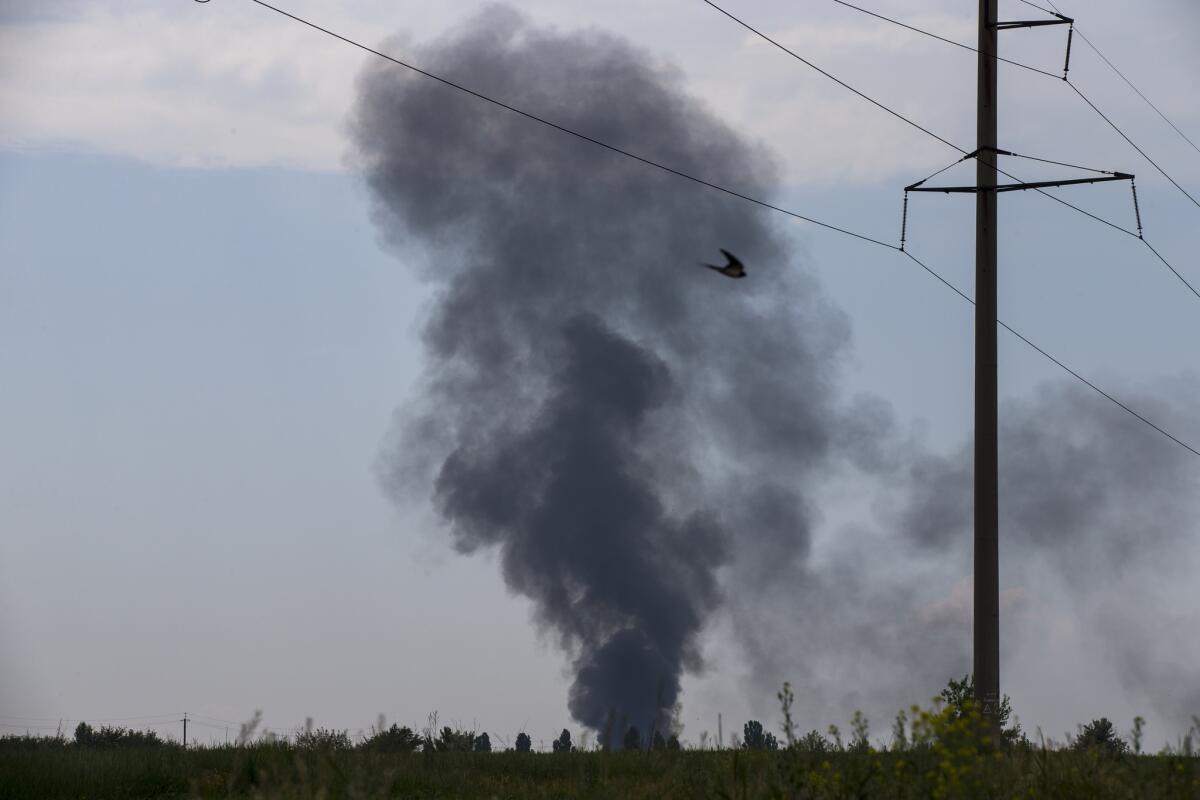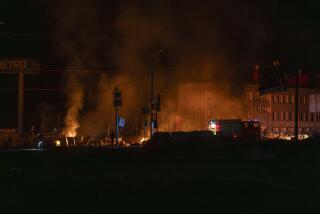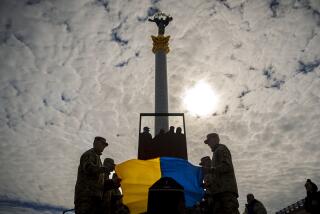Pro-Russia rebels shoot down Ukrainian helicopter, killing 12

Rebels in the embattled eastern Ukrainian town of Slovyansk shot down a military helicopter on Thursday, killing at least a dozen Ukrainian soldiers, as heavy fighting continued in the area that has been the epicenter of the pro-Russia insurgency for more than two months.
The government troops killed in the crash of the transport helicopter included a general, Volodymyr Kulchitsky, acting President Oleksandr Turchynov told lawmakers in Kiev in a televised announcement.
Turchynov put the death toll at 14, but a later report from the Defense Ministry said 12 were killed and that at least one surviving soldier was in critical condition.
The Ukrainian armed forces have lost scores of soldiers and airmen in recent weeks in the largely unsuccessful operation to regain control of a dozen towns and cities in the eastern Donetsk and Luhansk regions seized by pro-Russian separatists trying to annex to neighboring Russia. The Ukrainian government did manage during heavy fighting on Monday to thwart a separatist takeover of Donetsk’s international airport, Ukraine’s second-largest and a key transport hub for the eastern region.
In Slovyansk, the self-proclaimed “mayor,” Vyacheslav Ponomaryov, confirmed that his gunmen had shot down the aircraft. “I have warned many times publicly that they should not be flying over our land,” he told The Times in a telephone interview. “I hope this will be another important lesson for Kiev.”
He said his forces had also fired on another helicopter that then returned to base. The rebels sustained no casualties during the attack, he said.
Separately, he told a Russian news service that his forces were holding four international security monitors missing from their mission in eastern Ukraine for four days. The monitors of the Organization for Security and Cooperation in Europe were detained Monday for disregarding separatist leaders’ orders that they cease traveling around the besieged area, Ponomaryov told the Interfax news agency in the embattled town.
“We had told them not to travel anywhere for a time but these four turned out to be very keen,” Ponomaryov said, intimating that the monitors — a Swiss, a Dane, an Estonian and a Turk — were engaged in espionage.
“Now we will work out who they are, where they were going and why, and we will let them go,” Ponomaryov told the news agency.
The detention of the four OSCE monitors by Ponomaryov’s gunmen was the second seizure of the mission’s members in the last month. A group of seven OSCE observers was held captive for a week in early May by the rebels, who contend they aren’t obliged to cooperate with the mission sanctioned by Russia, Ukraine and the rest of the security alliance’s 57 member states.
OSCE headquarters in Vienna lost contact Monday evening with the four monitors operating in the Donetsk area. The Swiss president who chairs the OSCE, Didier Burkhalter, denounced the detention of the monitors as “sabotage.”
Veteran German diplomat Wolfgang Ischinger, who heads a separate OSCE mission in Ukraine, warned that the continued assaults on the monitors’ security could force the unarmed representatives to abandon their work of recording incidents of human rights violations and rogue military operations.
“If the security situation is such that one must fear for the lives of our employees, then I fear that we really would have to withdraw,” Ischinger told Germany’s ZDF television.
That would give the pro-Russia rebels greater latitude to seize more territory and would be a move opposed by Ukraine, which remains in an uncertain political position until the newly elected president, billionaire candy maker Petro Poroshenko, is inaugurated on June 15.
Turchynov was named interim president by the Ukrainian parliament in late February after the elected head of state, Viktor Yanukovich, fled Kiev after being forced from office by a three-month rebellion.
Russia has refused to acknowledge the authority of the interim leaders, claiming they seized power in a coup d’etat. The Kremlin has also cast Turchynov and the other former opposition lawmakers running the transitional government as neo-fascists aiming to repress the Russian-speaking communities in eastern Ukraine. Russian President Vladimir Putin used the claim to justify his troops’ seizure of Ukraine’s Crimean peninsula and to excuse the pro-Russian separatists’ declarations of independence from rule by Kiev.
Times staff writer Sergei L. Loiko in Moscow contributed to this report.
More to Read
Start your day right
Sign up for Essential California for news, features and recommendations from the L.A. Times and beyond in your inbox six days a week.
You may occasionally receive promotional content from the Los Angeles Times.







